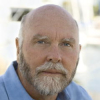Craig Venter

Craig Venter
John Craig Venteris an American biotechnologist, biochemist, geneticist, and entrepreneur. He is known for being one of the first to sequence the human genome and the first to transfect a cell with a synthetic genome. Venter founded Celera Genomics, The Institute for Genomic Researchand the J. Craig Venter Institute, and is now CEO of Human Longevity Inc. He was listed on Time magazine's 2007 and 2008 Time 100 list of the most influential people in the world. In 2010, the...
NationalityAmerican
ProfessionScientist
Date of Birth14 October 1946
CountryUnited States of America
We're moving from reading the genetic code to writing it.
Mathematicians have been hiding and writing messages in the genetic code for a long time, but it's clear they were mathematicians and not biologists because, if you write long messages with the code that the mathematicians developed, it would more than likely lead to new proteins being synthesized with unknown functions.
We are going from reading our genetic code to the ability to write it. That gives us the hypothetical ability to do things never contemplated before.
Even with seemingly simple things like eye color, you can't tell from my genetic code whether I have blue eyes or not. So it's naive to think that complex human behaviors, like risk-seeking, are driven by changes in one or two genes.
We can do genetics. We can do experiments on fruit flies. We can do experiments on yeast. It's not so easy to do experiments on humans. So, in fact, it helps us, to interpret our own genetic code, to have the genetic code of the other species.
When you think of all the things that are made from oil or in the chemical industry, if in the future we could find cells to replace most of those processes, the ideal way would be to do it by direct design.
There are enzymes called restriction enzymes that actually digest DNA.
We're a country of laws and rules, and the Supreme Court has ruled that life forms are patentable entities.
There is a long history of how DNA sequencing can bring certainty to people's lives.
Right now, oil is being isolated around the globe, and there is a major effort in shipping, trucking and otherwise transporting that oil around to a very finite number of refineries. Biology allows us to make these same fuels in a much more distributed fashion.
Organisms in the ocean provide over 40 percent of the oxygen we breathe, and they're the major sink for capturing all the carbon dioxide we constantly release into the atmosphere.
Life was so cheap in Vietnam. That is where my sense of urgency comes from.
I willed myself through a junior college to a university and, ultimately, a Ph.D.
I think I'm a survivor. I could have suffered at least 100 professional deaths. I could come up with a list of the 100 times I've come closest to death, from having pneumonia as a child to car crashes.